Unit 9 I like music that I can dance to. Section B 2a—Self Check课件 (共37张PPT) 人教版九年级全册
文档属性
| 名称 | Unit 9 I like music that I can dance to. Section B 2a—Self Check课件 (共37张PPT) 人教版九年级全册 |
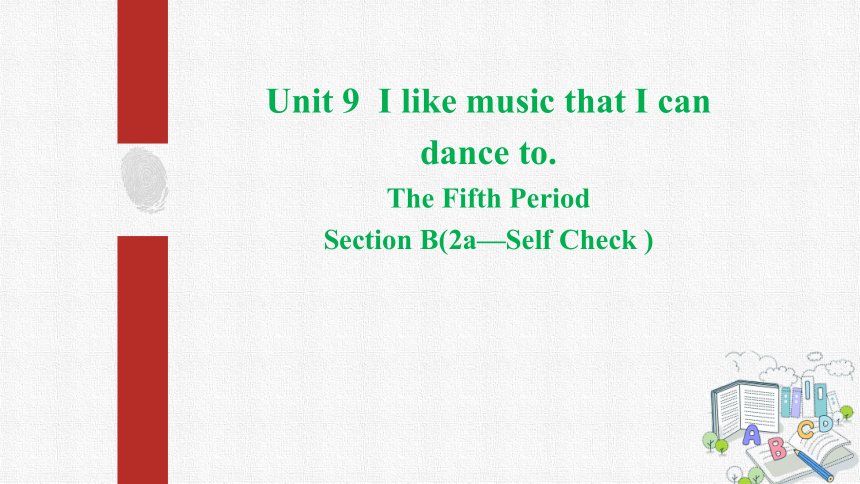
|
|
| 格式 | pptx | ||
| 文件大小 | 2.8MB | ||
| 资源类型 | 教案 | ||
| 版本资源 | 人教新目标(Go for it)版 | ||
| 科目 | 英语 | ||
| 更新时间 | 2025-01-05 17:23:14 | ||
图片预览

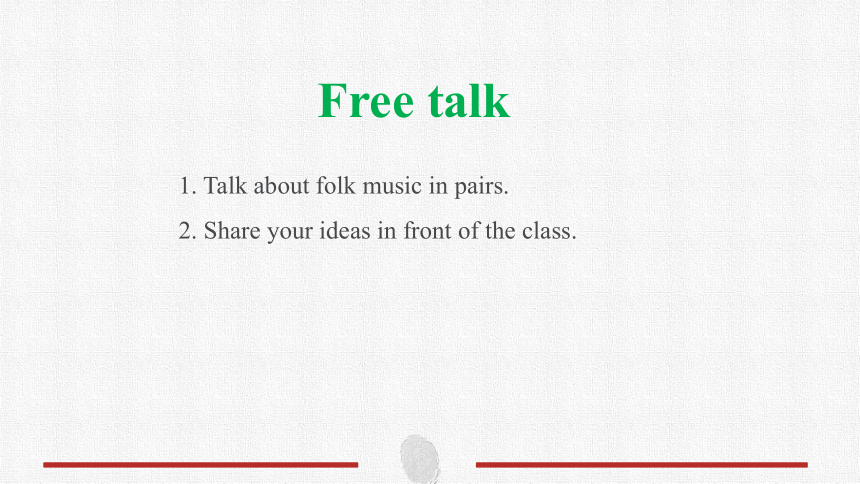
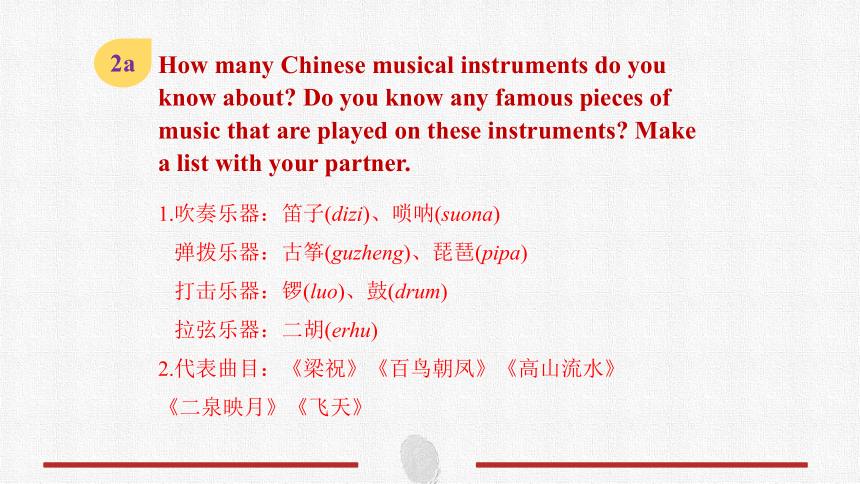
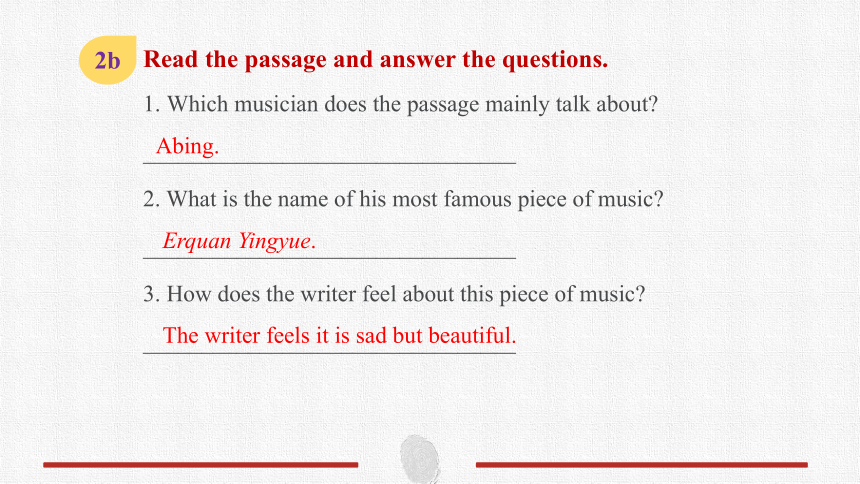
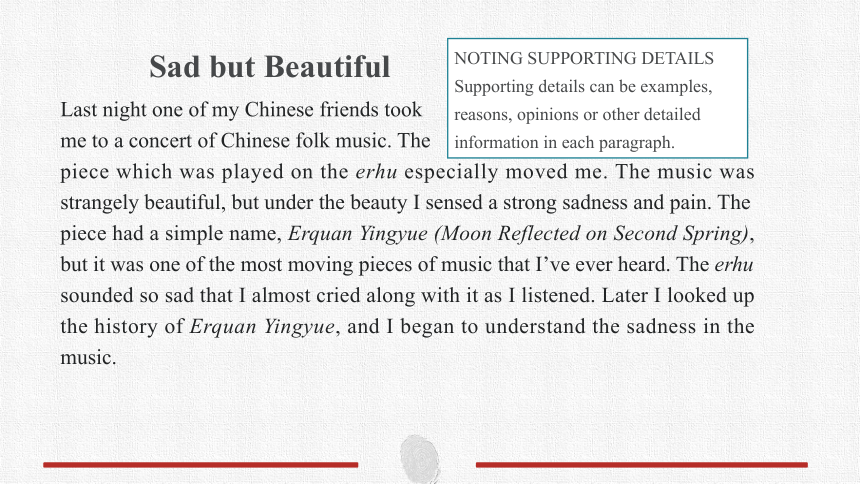
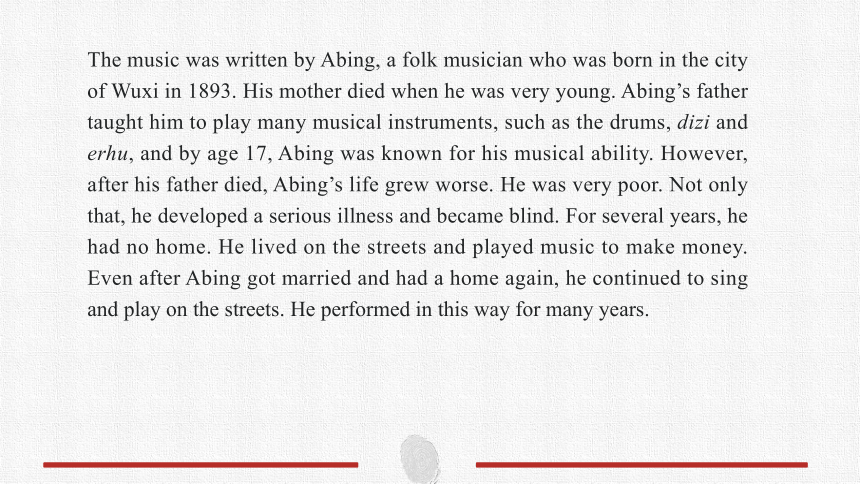
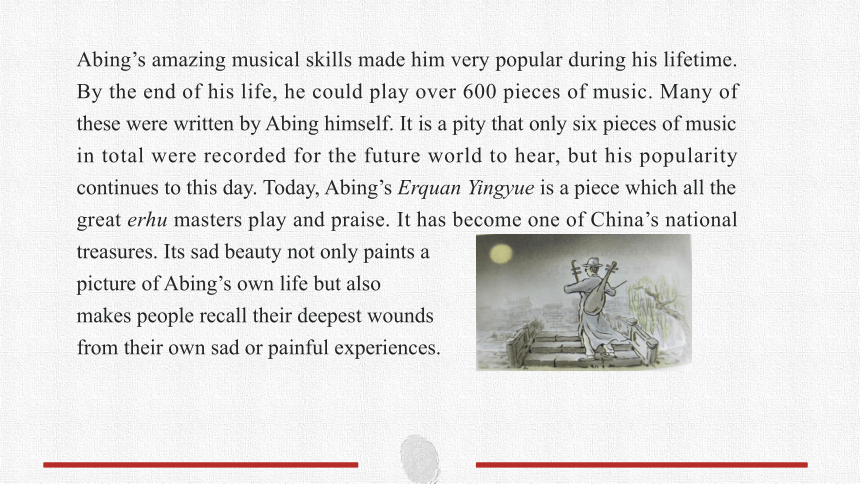
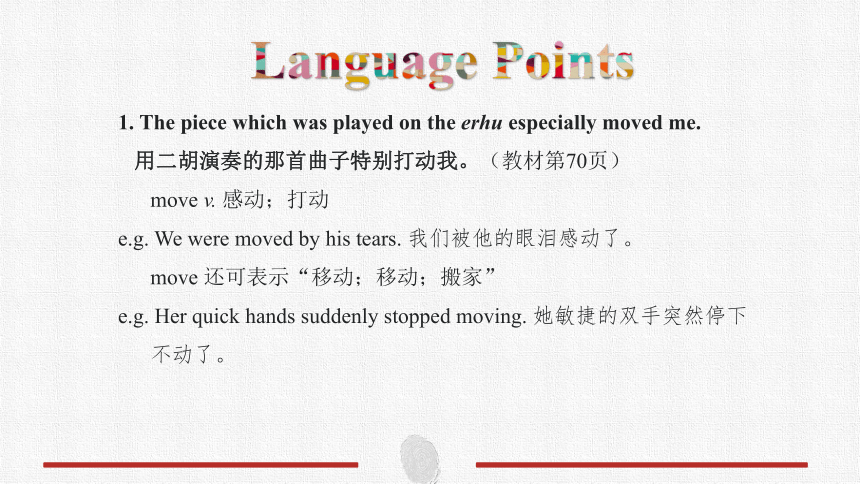
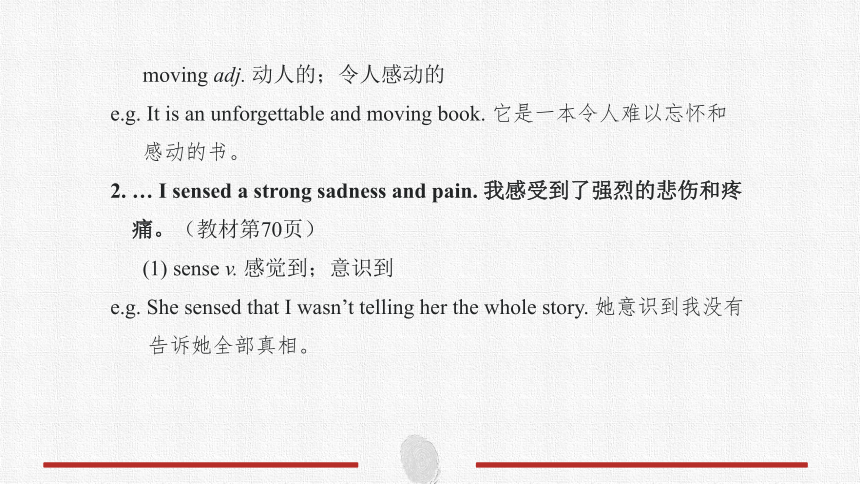
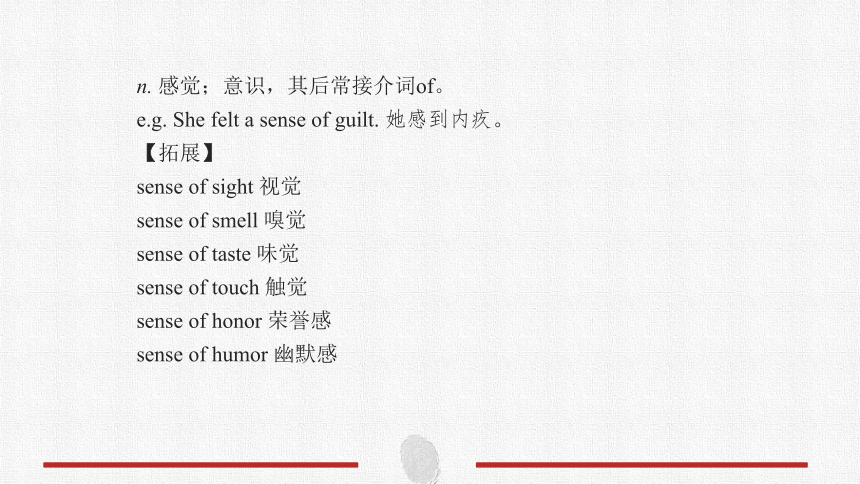
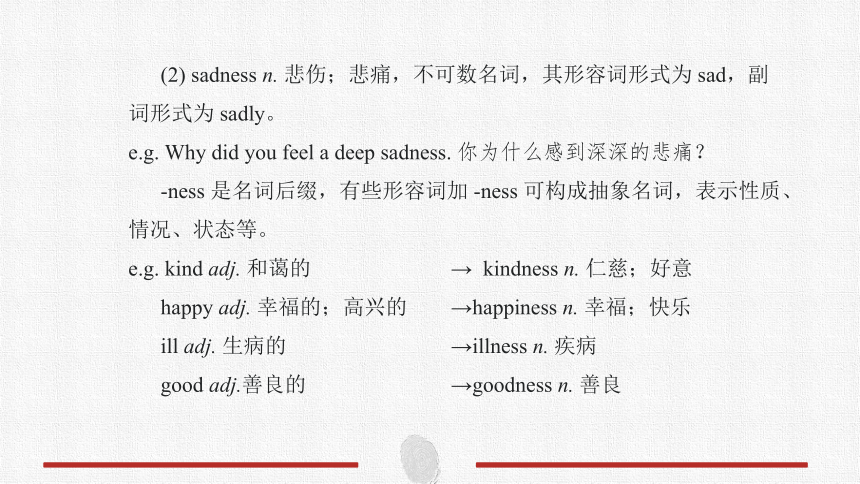
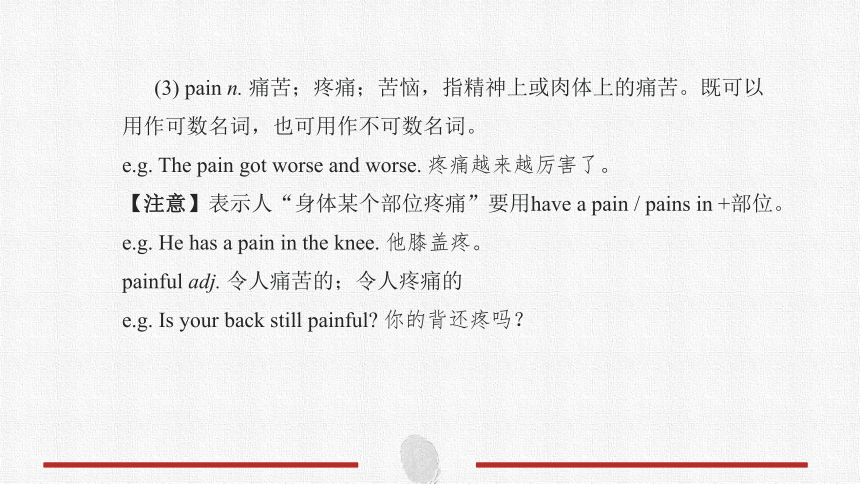
文档简介
(共37张PPT)
Unit 9 I like music that I can dance to.
The Fifth Period
Section B(2a—Self Check )
Free talk
1. Talk about folk music in pairs.
2. Share your ideas in front of the class.
How many Chinese musical instruments do you know about Do you know any famous pieces of music that are played on these instruments Make
a list with your partner.
2a
1.吹奏乐器:笛子(dizi)、唢呐(suona)
弹拨乐器:古筝(guzheng)、琵琶(pipa)
打击乐器:锣(luo)、鼓(drum)
拉弦乐器:二胡(erhu)
2.代表曲目:《梁祝》《百鸟朝凤》《高山流水》《二泉映月》《飞天》
1. Which musician does the passage mainly talk about
________________________________
2. What is the name of his most famous piece of music
________________________________
3. How does the writer feel about this piece of music
________________________________
Read the passage and answer the questions.
2b
Abing.
Erquan Yingyue.
The writer feels it is sad but beautiful.
Sad but Beautiful
NOTING SUPPORTING DETAILS
Supporting details can be examples, reasons, opinions or other detailed
information in each paragraph.
Last night one of my Chinese friends took
me to a concert of Chinese folk music. The
piece which was played on the erhu especially moved me. The music was strangely beautiful, but under the beauty I sensed a strong sadness and pain. The piece had a simple name, Erquan Yingyue (Moon Reflected on Second Spring), but it was one of the most moving pieces of music that I’ve ever heard. The erhu sounded so sad that I almost cried along with it as I listened. Later I looked up the history of Erquan Yingyue, and I began to understand the sadness in the music.
The music was written by Abing, a folk musician who was born in the city of Wuxi in 1893. His mother died when he was very young. Abing’s father taught him to play many musical instruments, such as the drums, dizi and erhu, and by age 17, Abing was known for his musical ability. However, after his father died, Abing’s life grew worse. He was very poor. Not only that, he developed a serious illness and became blind. For several years, he had no home. He lived on the streets and played music to make money. Even after Abing got married and had a home again, he continued to sing and play on the streets. He performed in this way for many years.
Abing’s amazing musical skills made him very popular during his lifetime. By the end of his life, he could play over 600 pieces of music. Many of these were written by Abing himself. It is a pity that only six pieces of music in total were recorded for the future world to hear, but his popularity continues to this day. Today, Abing’s Erquan Yingyue is a piece which all the great erhu masters play and praise. It has become one of China’s national treasures. Its sad beauty not only paints a
picture of Abing’s own life but also
makes people recall their deepest wounds
from their own sad or painful experiences.
1. The piece which was played on the erhu especially moved me.
用二胡演奏的那首曲子特别打动我。(教材第70页)
move v. 感动;打动
e.g. We were moved by his tears. 我们被他的眼泪感动了。
move 还可表示“移动;移动;搬家”
e.g. Her quick hands suddenly stopped moving. 她敏捷的双手突然停下
不动了。
Language Points
moving adj. 动人的;令人感动的
e.g. It is an unforgettable and moving book. 它是一本令人难以忘怀和
感动的书。
2. … I sensed a strong sadness and pain. 我感受到了强烈的悲伤和疼
痛。(教材第70页)
(1) sense v. 感觉到;意识到
e.g. She sensed that I wasn’t telling her the whole story. 她意识到我没有
告诉她全部真相。
n. 感觉;意识,其后常接介词of。
e.g. She felt a sense of guilt. 她感到内疚。
【拓展】
sense of sight 视觉
sense of smell 嗅觉
sense of taste 味觉
sense of touch 触觉
sense of honor 荣誉感
sense of humor 幽默感
(2) sadness n. 悲伤;悲痛,不可数名词,其形容词形式为 sad,副词形式为 sadly。
e.g. Why did you feel a deep sadness. 你为什么感到深深的悲痛?
-ness 是名词后缀,有些形容词加 -ness 可构成抽象名词,表示性质、情况、状态等。
e.g. kind adj. 和蔼的 → kindness n. 仁慈;好意
happy adj. 幸福的;高兴的 →happiness n. 幸福;快乐
ill adj. 生病的 →illness n. 疾病
good adj.善良的 →goodness n. 善良
(3) pain n. 痛苦;疼痛;苦恼,指精神上或肉体上的痛苦。既可以用作可数名词,也可用作不可数名词。
e.g. The pain got worse and worse. 疼痛越来越厉害了。
【注意】表示人“身体某个部位疼痛”要用have a pain / pains in +部位。
e.g. He has a pain in the knee. 他膝盖疼。
painful adj. 令人痛苦的;令人疼痛的
e.g. Is your back still painful 你的背还疼吗?
3. reflect 的用法(教材第70页)
reflect v. 反映;映出
e.g. His face was reflected in the mirror. 他的脸映照在镜子里。
reflect 还可以表示“显示,表明,表达”。
e.g. Our newspaper aims to reflect the views of the local community. 我们的
报纸旨在表达当地人民的心声。
reflect 后可以接 that 从句,表示“深思,仔细考虑”。
e.g. He reflected that she was probably right after all. 他深思后明白她可能真
的是对的。
4. Later I looked up the history of Erquan Yingyue, …后来我查阅《二泉映月》的历史……(教材第70页)
look up 查阅。代词作其宾语时,只能放在两词之间。
e.g. You can look it up in your dictionary. 你可以在字典中查阅。
look up 还可表示“抬头看”。
e.g. Don’t look up. 不要向上看。
【拓展】
look after 照顾 look around 环顾四周
look at 看 look for 寻找
look into 朝……里面看;调查 look like 看起来像……
look out of 朝……外看 look over 仔细检查;温习
look through 浏览;透过……看
5. be known for 因……而出名(教材第70页)
be known for 相当于 be famous for
e.g. Einstein was known for his theory of relativity. 爱因斯坦以他的相对
论而闻名。
【拓展】(1) be known as 意为“以某种身份出名”。
e.g. Einstein was known as a great scientist. 爱因斯坦以一位伟大的科学
家著称。
(2) be known to 意为“为……所熟知”。
e.g. He is known to us all. 我们都熟悉他。
6. Even after Abing got married and had a home again, he continued to sing and play on the streets. 即使在阿炳结婚并且有了家后,他继续走上街头卖艺。(教材第70页)
continue to do sth.意为“继续做某事”,还可用continue doing sth.或continue with sth.,它们在意思上没有明显的区别。
e.g. She continued to work after she had her baby. 她生了孩子后继续工作。
They continued to meet every day. 他们继续每天见面。
He continued watching me. 他继续监视我。
7. He performed in this way for many years. 他以这种方式演出了多年。(教材第70页)
(1) perform v. 表演;执行;履行
e.g. They are performing at the Sunshine Town now. 他们现在正在阳光城表演。
He performed an operation yesterday. 他昨天做了一个手术。
She performs an important role in our organization. 她在我们的组织中
发挥着重要的作用。
【拓展】performance n. 表演;执行 performer n. 表演者
(2) in this way 意为“这样,通过这种方法”,可以放在句首或句末。其中 way 为名词,意为“方式,方法”。
e.g. Please do it in this way. 请用这种方法做这件事。
In this way you’ll find the answer to the question. 用这种方法,你会
找到这个问题的答案。
8. It is a pity that only six pieces of music in total were recorded for the future world to hear, but his popularity continues to this day. 遗憾的是,总共只有六首曲子被录制下来得以传世,但他的人气一直持续到今天。(教材第70页)
(1) total adj. 总的,全体的 n. 总数;合计,in total 总共
e.g. The club has a total membership of 100. 这家俱乐部的成员总数为
100人。
The factory has a total of 2,000 workers. 这家工厂总共有2000名工人。
How much did your mother pay in total 你妈妈一共付了多少钱?
(2) It’s a pity that … ……真是遗憾
e.g. It’s a pity that they can’t stay longer. 他们不能再多停留些时间,真是
遗憾。
9. master的用法(教材第70页)
v. 掌握
e.g. We should master new skills. 我们需要掌握新的技术。
n. 大师;能手;主人
e.g. Are you a master of French and English 你精通法语和英语吗?
The dog didn’t obey its master. 这只狗没有听从主人的话。
10. praise的用法(教材第70页)
v. & n. 表扬;赞扬
e.g. She praised his cooking. 她称赞他的烹调技术。
His teachers are full of praise for the progress he’s making. 老师们对他
的进步赞不绝口
【拓展】
(1) praise sb./sth. (for sth.) 因某事而表扬某人
e.g. He praised his team for their performance. 他称赞了各队员的表现。
(2) praise sb./sth. (as sth.) 称赞……是……
e.g. Motorways are praised by the Ministry of Transport as Britain’s safest
roads.高速公路被交通部誉为英国最安全的道路。
11. wound 的用法(教材第70页)
n. 伤;伤口;创伤
e.g. Could you please help me to clean the wound 你能帮我清理一下伤口吗?
v. 使(身体)受伤;伤害
e.g. Had you been wounded in the arm 你的手臂受过伤吗?
【拓展】辨析 hurt, wound, harm 与 damage
hurt:侧重指给有生命的物体造成机体或精神、感情上的伤害。
wound:特指对身体的伤害,尤指在战斗中受的伤,强调外部的创伤,也
可指精神的伤害。
harm:主要用于有生命的东西,指引起严重的痛苦和损伤;有时也用于抽
象的事物,指造成不良后果。
damage:通常指对无生命物体的损害,有降低物体的价值、破坏其功能的
后果。
Paragraph Main idea Supporting details
1 I was _______ by a piece of music named Erquan Yingyue. The music was strangely beautiful …
2 Abing lived a very _______ life.
3 Abing’s musical skills made him very _________.
moved
poor
popular
He lived on the streets and played music to make money…
By the end of his life,he could play over 600 pieces of music.It’s a pity that only six pieces of music were recorded for us to hear,but his popularity continues to this day.
Read the passage again and use suitable words to complete the main idea of each paragraph. Then list the supporting details in each paragraph.
2c
Abing played music (that/who) could touch the hearts of people. When we listen to his music, we can ___________ both the beauty and the sadness in it. It makes us think about the ___________ and ___________ (that/who) we have experienced in the past. For this reason, many people ___________ him as the musician who has greatly influenced erhu music. So it is really a ___________ that not many pieces of his music were recorded.
pain
wounds
sense
pity
praise
sense
pain/wounds
wounds/pain
praise
pity
Circle that or who and fill in the blanks with the words in the box.
2d
A: What kind of musical instruments did Abing play
B: He could play many instruments, but he is best
known for playing the erhu.
Student A is a foreign visitor who is interested in Abing and his music. Student B is a Chinese student who knows about Abing. Use the information in the passage to make a conversation.
2e
e.g. A:Who taught him to play the musical instruments
B:His father.
A:When and where was Abing born
B:He was born in the city of Wuxi in 1893.
Favorite kind of music/movie
Why I like this kind of music/ movie
Favorite song/movie
Why I like this song/movie
How this song/movie makes me feel
Why I think others should listen to/watch this song/movie
What kind of music or movies do you like best What is your favorite song/movie Make notes in the chart below.
3a
Historical drama
Make me aware of some important historical events and how they affected people’s lives.
Gone with the Wind
It has a very interesting storyline and an excellent cast.
Deeply moved — sad about the effects of war; but have hope in the human spirit.
One of the best movies of all time
Use the following expressions to help you:
My favorite kind of music/movie is …
I like … because …
It was … by …
When I listen to / watch it, I feel …
I think you should listen to / watch it too bacause …
Use your notes to write an article for a newspaper or magazine to tell people about your favorite kind of music/movie and your favorite song/movie.
3b
●
●
●
●
●
思路点拨:
1.体裁:说明文
2.人称:第一人称、第三人称
3.时态:一般现在时
写作步骤:
第一步:审题,找出文章要表达的主题。
第二步:用简单的句子或短语列出文章要点。
第三步:添加首尾句,使文章结构完整。
第四步:用恰当的关联词,使句子和段落衔接自然。
开篇点题 My favorite kind of movie is …
喜欢理由 I like … because …
建议理由 I think you should watch it too because …
参考范文:
My favorite kind of movie is the historical drama.I like the historical drama because it’s a relaxing way for me to learn history and the effects that a historical event had on people’s lives.
My favorite movie is Gone with the Wind.It was made in 1939,based on a prize-winning novel by Margaret Mitchell.The movie’s plot is set against the American Civil War and it has an excellent cast that helps bring the story to life.
When I watch this movie,I feel deeply moved.It makes me feel sad about the effects of the war,but it also gives me hope in the strength of the human spirit.
I think you should watch it too because it is one of the most greatest movies of all time.
1 Fill in the blanks with the words in the box.
1. The comedy has _________ dialog which is very humorous.
2. Since you prefer music that is relaxing, I don’t _________
you would want to buy this ___________ music CD.
3. Christmas is a time for spreading joy, so you should find
some _______ time to spend with your loved ones.
4. Although he is an _______ who does not have much
experience, he did an excellent job in the new ______ film.
Self Check
plenty of
suppose
war
electronic
actor
spare
plenty of
suppose
electronic
spare
actor
war
Fill in the blanks with who, that or which. More than one
answer may be possible.
A: Hi, Cindy! Would you like to see Sky High in 2050 this weekend
B: Hmm … no, I don’t think movies ___________ try to describe the future
are very interesting. Could we see City Danger instead
A: You mean, the new police story ___________ was filmed in five countries
B: Yes, that’s the one. The actor ___________ plays the hero used to be a
schoolteacher!
A: OK, sure. It sounds like something _________ we both will enjoy!
that/which
that/which
who/that
that
3 Complete the sentences about yourself.
1. I don’t like music _________________________________
2. I enjoy spending time in places ______________________
3. I have friends ____________________________________
4. I like movie stars _________________________________
that/which is too loud.
which/that are interesting.
who/that share the same hobby with me.
who/that are beautiful.
一、用所给单词的适当形式填空
1. He prefers __________(study) with a group.
2. My knee is still too _________(pain) to walk on.
3. He’s afraid to see the __________(sad) on his mother’s face.
4. I had a __________(move) experience to Beijing.
painful
studying
sadness
moving
Exercise
二、语篇填空之基础训练
1. A computer can __________ many tasks(任务) at once.
2. Tom’s father ________ Tom for his courage yesterday.
3. It is a great ________ that not all of us have the same chances.
4. There are seven books on the desk in ________.
5. Lisa ________ that he did not believe her.
perform
praised
pity sense total perform praise
pity
total
sensed
三、根据汉语意思完成句子
1. 他在空闲时间学音乐。
He studies music ______ ______ ________ ________.
2. 我想你不能开车。
I _________ _______________ you can drive the car.
3. 我喜欢让我开心的电影。
I like the movies ____________ ________ me happy.
don’t suppose/think
in his spare time
that/which make
1. Recite the important phrases.
2. Write an article about your favorite movie/song.
Homework
Unit 9 I like music that I can dance to.
The Fifth Period
Section B(2a—Self Check )
Free talk
1. Talk about folk music in pairs.
2. Share your ideas in front of the class.
How many Chinese musical instruments do you know about Do you know any famous pieces of music that are played on these instruments Make
a list with your partner.
2a
1.吹奏乐器:笛子(dizi)、唢呐(suona)
弹拨乐器:古筝(guzheng)、琵琶(pipa)
打击乐器:锣(luo)、鼓(drum)
拉弦乐器:二胡(erhu)
2.代表曲目:《梁祝》《百鸟朝凤》《高山流水》《二泉映月》《飞天》
1. Which musician does the passage mainly talk about
________________________________
2. What is the name of his most famous piece of music
________________________________
3. How does the writer feel about this piece of music
________________________________
Read the passage and answer the questions.
2b
Abing.
Erquan Yingyue.
The writer feels it is sad but beautiful.
Sad but Beautiful
NOTING SUPPORTING DETAILS
Supporting details can be examples, reasons, opinions or other detailed
information in each paragraph.
Last night one of my Chinese friends took
me to a concert of Chinese folk music. The
piece which was played on the erhu especially moved me. The music was strangely beautiful, but under the beauty I sensed a strong sadness and pain. The piece had a simple name, Erquan Yingyue (Moon Reflected on Second Spring), but it was one of the most moving pieces of music that I’ve ever heard. The erhu sounded so sad that I almost cried along with it as I listened. Later I looked up the history of Erquan Yingyue, and I began to understand the sadness in the music.
The music was written by Abing, a folk musician who was born in the city of Wuxi in 1893. His mother died when he was very young. Abing’s father taught him to play many musical instruments, such as the drums, dizi and erhu, and by age 17, Abing was known for his musical ability. However, after his father died, Abing’s life grew worse. He was very poor. Not only that, he developed a serious illness and became blind. For several years, he had no home. He lived on the streets and played music to make money. Even after Abing got married and had a home again, he continued to sing and play on the streets. He performed in this way for many years.
Abing’s amazing musical skills made him very popular during his lifetime. By the end of his life, he could play over 600 pieces of music. Many of these were written by Abing himself. It is a pity that only six pieces of music in total were recorded for the future world to hear, but his popularity continues to this day. Today, Abing’s Erquan Yingyue is a piece which all the great erhu masters play and praise. It has become one of China’s national treasures. Its sad beauty not only paints a
picture of Abing’s own life but also
makes people recall their deepest wounds
from their own sad or painful experiences.
1. The piece which was played on the erhu especially moved me.
用二胡演奏的那首曲子特别打动我。(教材第70页)
move v. 感动;打动
e.g. We were moved by his tears. 我们被他的眼泪感动了。
move 还可表示“移动;移动;搬家”
e.g. Her quick hands suddenly stopped moving. 她敏捷的双手突然停下
不动了。
Language Points
moving adj. 动人的;令人感动的
e.g. It is an unforgettable and moving book. 它是一本令人难以忘怀和
感动的书。
2. … I sensed a strong sadness and pain. 我感受到了强烈的悲伤和疼
痛。(教材第70页)
(1) sense v. 感觉到;意识到
e.g. She sensed that I wasn’t telling her the whole story. 她意识到我没有
告诉她全部真相。
n. 感觉;意识,其后常接介词of。
e.g. She felt a sense of guilt. 她感到内疚。
【拓展】
sense of sight 视觉
sense of smell 嗅觉
sense of taste 味觉
sense of touch 触觉
sense of honor 荣誉感
sense of humor 幽默感
(2) sadness n. 悲伤;悲痛,不可数名词,其形容词形式为 sad,副词形式为 sadly。
e.g. Why did you feel a deep sadness. 你为什么感到深深的悲痛?
-ness 是名词后缀,有些形容词加 -ness 可构成抽象名词,表示性质、情况、状态等。
e.g. kind adj. 和蔼的 → kindness n. 仁慈;好意
happy adj. 幸福的;高兴的 →happiness n. 幸福;快乐
ill adj. 生病的 →illness n. 疾病
good adj.善良的 →goodness n. 善良
(3) pain n. 痛苦;疼痛;苦恼,指精神上或肉体上的痛苦。既可以用作可数名词,也可用作不可数名词。
e.g. The pain got worse and worse. 疼痛越来越厉害了。
【注意】表示人“身体某个部位疼痛”要用have a pain / pains in +部位。
e.g. He has a pain in the knee. 他膝盖疼。
painful adj. 令人痛苦的;令人疼痛的
e.g. Is your back still painful 你的背还疼吗?
3. reflect 的用法(教材第70页)
reflect v. 反映;映出
e.g. His face was reflected in the mirror. 他的脸映照在镜子里。
reflect 还可以表示“显示,表明,表达”。
e.g. Our newspaper aims to reflect the views of the local community. 我们的
报纸旨在表达当地人民的心声。
reflect 后可以接 that 从句,表示“深思,仔细考虑”。
e.g. He reflected that she was probably right after all. 他深思后明白她可能真
的是对的。
4. Later I looked up the history of Erquan Yingyue, …后来我查阅《二泉映月》的历史……(教材第70页)
look up 查阅。代词作其宾语时,只能放在两词之间。
e.g. You can look it up in your dictionary. 你可以在字典中查阅。
look up 还可表示“抬头看”。
e.g. Don’t look up. 不要向上看。
【拓展】
look after 照顾 look around 环顾四周
look at 看 look for 寻找
look into 朝……里面看;调查 look like 看起来像……
look out of 朝……外看 look over 仔细检查;温习
look through 浏览;透过……看
5. be known for 因……而出名(教材第70页)
be known for 相当于 be famous for
e.g. Einstein was known for his theory of relativity. 爱因斯坦以他的相对
论而闻名。
【拓展】(1) be known as 意为“以某种身份出名”。
e.g. Einstein was known as a great scientist. 爱因斯坦以一位伟大的科学
家著称。
(2) be known to 意为“为……所熟知”。
e.g. He is known to us all. 我们都熟悉他。
6. Even after Abing got married and had a home again, he continued to sing and play on the streets. 即使在阿炳结婚并且有了家后,他继续走上街头卖艺。(教材第70页)
continue to do sth.意为“继续做某事”,还可用continue doing sth.或continue with sth.,它们在意思上没有明显的区别。
e.g. She continued to work after she had her baby. 她生了孩子后继续工作。
They continued to meet every day. 他们继续每天见面。
He continued watching me. 他继续监视我。
7. He performed in this way for many years. 他以这种方式演出了多年。(教材第70页)
(1) perform v. 表演;执行;履行
e.g. They are performing at the Sunshine Town now. 他们现在正在阳光城表演。
He performed an operation yesterday. 他昨天做了一个手术。
She performs an important role in our organization. 她在我们的组织中
发挥着重要的作用。
【拓展】performance n. 表演;执行 performer n. 表演者
(2) in this way 意为“这样,通过这种方法”,可以放在句首或句末。其中 way 为名词,意为“方式,方法”。
e.g. Please do it in this way. 请用这种方法做这件事。
In this way you’ll find the answer to the question. 用这种方法,你会
找到这个问题的答案。
8. It is a pity that only six pieces of music in total were recorded for the future world to hear, but his popularity continues to this day. 遗憾的是,总共只有六首曲子被录制下来得以传世,但他的人气一直持续到今天。(教材第70页)
(1) total adj. 总的,全体的 n. 总数;合计,in total 总共
e.g. The club has a total membership of 100. 这家俱乐部的成员总数为
100人。
The factory has a total of 2,000 workers. 这家工厂总共有2000名工人。
How much did your mother pay in total 你妈妈一共付了多少钱?
(2) It’s a pity that … ……真是遗憾
e.g. It’s a pity that they can’t stay longer. 他们不能再多停留些时间,真是
遗憾。
9. master的用法(教材第70页)
v. 掌握
e.g. We should master new skills. 我们需要掌握新的技术。
n. 大师;能手;主人
e.g. Are you a master of French and English 你精通法语和英语吗?
The dog didn’t obey its master. 这只狗没有听从主人的话。
10. praise的用法(教材第70页)
v. & n. 表扬;赞扬
e.g. She praised his cooking. 她称赞他的烹调技术。
His teachers are full of praise for the progress he’s making. 老师们对他
的进步赞不绝口
【拓展】
(1) praise sb./sth. (for sth.) 因某事而表扬某人
e.g. He praised his team for their performance. 他称赞了各队员的表现。
(2) praise sb./sth. (as sth.) 称赞……是……
e.g. Motorways are praised by the Ministry of Transport as Britain’s safest
roads.高速公路被交通部誉为英国最安全的道路。
11. wound 的用法(教材第70页)
n. 伤;伤口;创伤
e.g. Could you please help me to clean the wound 你能帮我清理一下伤口吗?
v. 使(身体)受伤;伤害
e.g. Had you been wounded in the arm 你的手臂受过伤吗?
【拓展】辨析 hurt, wound, harm 与 damage
hurt:侧重指给有生命的物体造成机体或精神、感情上的伤害。
wound:特指对身体的伤害,尤指在战斗中受的伤,强调外部的创伤,也
可指精神的伤害。
harm:主要用于有生命的东西,指引起严重的痛苦和损伤;有时也用于抽
象的事物,指造成不良后果。
damage:通常指对无生命物体的损害,有降低物体的价值、破坏其功能的
后果。
Paragraph Main idea Supporting details
1 I was _______ by a piece of music named Erquan Yingyue. The music was strangely beautiful …
2 Abing lived a very _______ life.
3 Abing’s musical skills made him very _________.
moved
poor
popular
He lived on the streets and played music to make money…
By the end of his life,he could play over 600 pieces of music.It’s a pity that only six pieces of music were recorded for us to hear,but his popularity continues to this day.
Read the passage again and use suitable words to complete the main idea of each paragraph. Then list the supporting details in each paragraph.
2c
Abing played music (that/who) could touch the hearts of people. When we listen to his music, we can ___________ both the beauty and the sadness in it. It makes us think about the ___________ and ___________ (that/who) we have experienced in the past. For this reason, many people ___________ him as the musician who has greatly influenced erhu music. So it is really a ___________ that not many pieces of his music were recorded.
pain
wounds
sense
pity
praise
sense
pain/wounds
wounds/pain
praise
pity
Circle that or who and fill in the blanks with the words in the box.
2d
A: What kind of musical instruments did Abing play
B: He could play many instruments, but he is best
known for playing the erhu.
Student A is a foreign visitor who is interested in Abing and his music. Student B is a Chinese student who knows about Abing. Use the information in the passage to make a conversation.
2e
e.g. A:Who taught him to play the musical instruments
B:His father.
A:When and where was Abing born
B:He was born in the city of Wuxi in 1893.
Favorite kind of music/movie
Why I like this kind of music/ movie
Favorite song/movie
Why I like this song/movie
How this song/movie makes me feel
Why I think others should listen to/watch this song/movie
What kind of music or movies do you like best What is your favorite song/movie Make notes in the chart below.
3a
Historical drama
Make me aware of some important historical events and how they affected people’s lives.
Gone with the Wind
It has a very interesting storyline and an excellent cast.
Deeply moved — sad about the effects of war; but have hope in the human spirit.
One of the best movies of all time
Use the following expressions to help you:
My favorite kind of music/movie is …
I like … because …
It was … by …
When I listen to / watch it, I feel …
I think you should listen to / watch it too bacause …
Use your notes to write an article for a newspaper or magazine to tell people about your favorite kind of music/movie and your favorite song/movie.
3b
●
●
●
●
●
思路点拨:
1.体裁:说明文
2.人称:第一人称、第三人称
3.时态:一般现在时
写作步骤:
第一步:审题,找出文章要表达的主题。
第二步:用简单的句子或短语列出文章要点。
第三步:添加首尾句,使文章结构完整。
第四步:用恰当的关联词,使句子和段落衔接自然。
开篇点题 My favorite kind of movie is …
喜欢理由 I like … because …
建议理由 I think you should watch it too because …
参考范文:
My favorite kind of movie is the historical drama.I like the historical drama because it’s a relaxing way for me to learn history and the effects that a historical event had on people’s lives.
My favorite movie is Gone with the Wind.It was made in 1939,based on a prize-winning novel by Margaret Mitchell.The movie’s plot is set against the American Civil War and it has an excellent cast that helps bring the story to life.
When I watch this movie,I feel deeply moved.It makes me feel sad about the effects of the war,but it also gives me hope in the strength of the human spirit.
I think you should watch it too because it is one of the most greatest movies of all time.
1 Fill in the blanks with the words in the box.
1. The comedy has _________ dialog which is very humorous.
2. Since you prefer music that is relaxing, I don’t _________
you would want to buy this ___________ music CD.
3. Christmas is a time for spreading joy, so you should find
some _______ time to spend with your loved ones.
4. Although he is an _______ who does not have much
experience, he did an excellent job in the new ______ film.
Self Check
plenty of
suppose
war
electronic
actor
spare
plenty of
suppose
electronic
spare
actor
war
Fill in the blanks with who, that or which. More than one
answer may be possible.
A: Hi, Cindy! Would you like to see Sky High in 2050 this weekend
B: Hmm … no, I don’t think movies ___________ try to describe the future
are very interesting. Could we see City Danger instead
A: You mean, the new police story ___________ was filmed in five countries
B: Yes, that’s the one. The actor ___________ plays the hero used to be a
schoolteacher!
A: OK, sure. It sounds like something _________ we both will enjoy!
that/which
that/which
who/that
that
3 Complete the sentences about yourself.
1. I don’t like music _________________________________
2. I enjoy spending time in places ______________________
3. I have friends ____________________________________
4. I like movie stars _________________________________
that/which is too loud.
which/that are interesting.
who/that share the same hobby with me.
who/that are beautiful.
一、用所给单词的适当形式填空
1. He prefers __________(study) with a group.
2. My knee is still too _________(pain) to walk on.
3. He’s afraid to see the __________(sad) on his mother’s face.
4. I had a __________(move) experience to Beijing.
painful
studying
sadness
moving
Exercise
二、语篇填空之基础训练
1. A computer can __________ many tasks(任务) at once.
2. Tom’s father ________ Tom for his courage yesterday.
3. It is a great ________ that not all of us have the same chances.
4. There are seven books on the desk in ________.
5. Lisa ________ that he did not believe her.
perform
praised
pity sense total perform praise
pity
total
sensed
三、根据汉语意思完成句子
1. 他在空闲时间学音乐。
He studies music ______ ______ ________ ________.
2. 我想你不能开车。
I _________ _______________ you can drive the car.
3. 我喜欢让我开心的电影。
I like the movies ____________ ________ me happy.
don’t suppose/think
in his spare time
that/which make
1. Recite the important phrases.
2. Write an article about your favorite movie/song.
Homework
同课章节目录
- Unit 1 How can we become good learners.
- Section A
- Section B
- Unit 2 I think that mooncakes are delicious!
- Section A
- Section B
- Unit 3 Could you please tell me where the restroom
- Section A
- Section B
- Unit 4 I used to be afraid of the dark.
- Section A
- Section B
- Unit 5 What are the shirts made of?
- Section A
- Section B
- Review of Units 1-5
- Unit 6 When was it invented?
- Section A
- Section B
- Unit 7 Teenagers should be allowed to choose their
- Section A
- Section B
- Unit 8 It must belong to Carla.
- Section A
- Section B
- Unit 9 I like music that I can dance to.
- Section A
- Section B
- Unit 10 You're supposed to shake hands.
- Section A
- Section B
- Review of Units 6-10
- Unit 11 Sad movies make me cry.
- Section A
- Section B
- Unit 12 Life is full of the unexpected
- Section A
- Section B
- Unit 13 We're trying to save the earth!
- Section A
- Section B
- Unit 14 I remember meeting all of you in Grade 7.
- Section A
- Section B
- Review of Units 11-14
